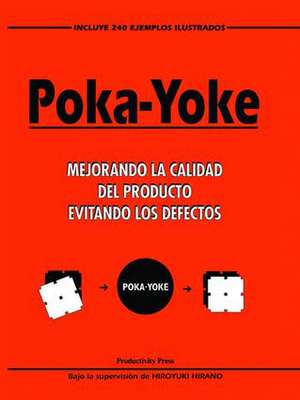Poka-yoke (Spanish): Mejorando la Calidad del Producto Evitando los Defectos
Autor H. Hiranoen Limba Engleză Hardback – 13 noi 2017
Errores de proceso Errores de montaje Errores de ensamble Inclusion de items erroneos Errores de insercion Omisiones en montaje Omisiones en proceso Errores de medicion Errores dimensionales Omision de operaciones Errores de operacion Errores de pegado Errores de inspeccion Errores de cableado Errores de pintura Errores de impresion Desalineamientos Errores en preparacion de mquinas Errores de embalaje Desajuste de plantillas y utiles Errores de lavado Problemas miscelaneos
Preț: 991.53 lei
Preț vechi: 1369.25 lei
-28% Nou
Puncte Express: 1487
Preț estimativ în valută:
189.72€ • 198.62$ • 156.99£
189.72€ • 198.62$ • 156.99£
Carte tipărită la comandă
Livrare economică 07-21 aprilie
Preluare comenzi: 021 569.72.76
Specificații
ISBN-13: 9781138464131
ISBN-10: 1138464139
Pagini: 316
Dimensiuni: 210 x 280 mm
Greutate: 0.71 kg
Ediția:1
Editura: Taylor & Francis
Colecția Productivity Press
Locul publicării:Oxford, United Kingdom
ISBN-10: 1138464139
Pagini: 316
Dimensiuni: 210 x 280 mm
Greutate: 0.71 kg
Ediția:1
Editura: Taylor & Francis
Colecția Productivity Press
Locul publicării:Oxford, United Kingdom
Public țintă
Professional Practice & DevelopmentCuprins
Prólogo del editor en lengua inglesa, Prólogo, Introducción, Resumen del Poka-yoke, 240 ejemplos de Poka-yoke, Fonnato para registrar mejoras, Indice de operadones, procesos y problemas
Descriere
Armed groups are intrinsic to conflict. Pursuing myriad aims, they shape and are shaped by the conflict landscape. UN missions too inhabit this landscape. They too must decide how best to pursue their goals of supporting early peacebuilding and so-called stabilisation. This book argues that the UN is peacekeeping in places where there is no peace to keep. A profoundly confused UN has failed to develop the instruments to adequately identify armed groups, and then deal with the challenge they pose. This book is a policy guide for UN missions. It contemplates the challenging nature of non-permissive UN mission environments and offers a challenge to the UN to think afresh about the way it undertakes missions in these settings. The book appropriates several underdeveloped concepts � robust peacekeeping, political processes, and the protection of civilians � and uses them to ignite the conversation on a UN stabilisation doctrine.
